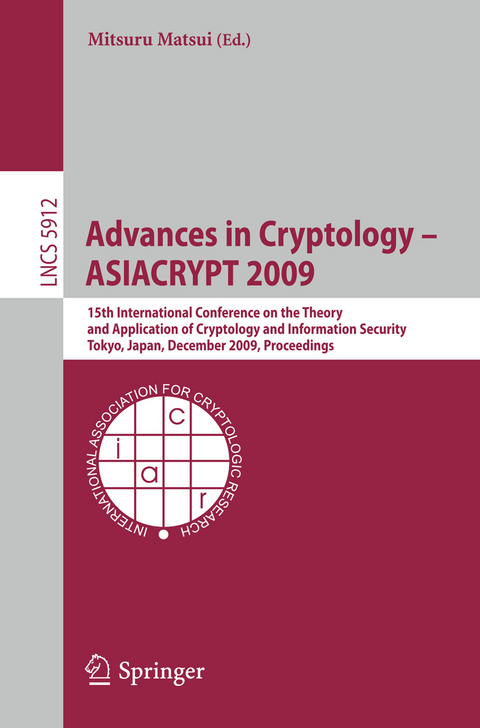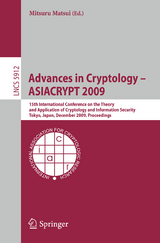Advances in Cryptology - ASIACRYPT 2009
Springer Berlin (Verlag)
978-3-642-10365-0 (ISBN)
Block Ciphers.- Related-Key Cryptanalysis of the Full AES-192 and AES-256.- The Key-Dependent Attack on Block Ciphers.- Cascade Encryption Revisited.- Quantum and Post-Quantum.- Quantum-Secure Coin-Flipping and Applications.- On the Power of Two-Party Quantum Cryptography.- Security Bounds for the Design of Code-Based Cryptosystems.- Hash Functions I.- Rebound Attack on the Full Lane Compression Function.- Rebound Distinguishers: Results on the Full Whirlpool Compression Function.- MD5 Is Weaker Than Weak: Attacks on Concatenated Combiners.- The Intel AES Instructions Set and the SHA-3 Candidates.- Encryption Schemes.- Group Encryption: Non-interactive Realization in the Standard Model.- On Black-Box Constructions of Predicate Encryption from Trapdoor Permutations.- Hierarchical Predicate Encryption for Inner-Products.- Hedged Public-Key Encryption: How to Protect against Bad Randomness.- Multi Party Computation.- Secure Two-Party Computation Is Practical.- Secure Multi-party Computation Minimizing Online Rounds.- Improved Non-committing Encryption with Applications to Adaptively Secure Protocols.- Cryptographic Protocols.- Non-malleable Statistically Hiding Commitment from Any One-Way Function.- Proofs of Storage from Homomorphic Identification Protocols.- Simple Adaptive Oblivious Transfer without Random Oracle.- Hash Functions II.- Improved Generic Algorithms for 3-Collisions.- A Modular Design for Hash Functions: Towards Making the Mix-Compress-Mix Approach Practical.- How to Confirm Cryptosystems Security: The Original Merkle-Damgård Is Still Alive!.- Models and Frameworks I.- On the Analysis of Cryptographic Assumptions in the Generic Ring Model.- Zero Knowledge in the Random Oracle Model, Revisited.- A Framework for Universally Composable Non-committing BlindSignatures.- Cryptanalysis: Sqaure and Quadratic.- Cryptanalysis of the Square Cryptosystems.- Factoring pq 2 with Quadratic Forms: Nice Cryptanalyses.- Attacking Power Generators Using Unravelled Linearization: When Do We Output Too Much?.- Models and Frameworks II.- Security Notions and Generic Constructions for Client Puzzles.- Foundations of Non-malleable Hash and One-Way Functions.- Hash Functions III.- Improved Cryptanalysis of Skein.- Linearization Framework for Collision Attacks: Application to CubeHash and MD6.- Preimages for Step-Reduced SHA-2.- Lattice-Based.- Fiat-Shamir with Aborts: Applications to Lattice and Factoring-Based Signatures.- Efficient Public Key Encryption Based on Ideal Lattices.- Smooth Projective Hashing and Password-Based Authenticated Key Exchange from Lattices.- Side Channels.- PSS Is Secure against Random Fault Attacks.- Cache-Timing Template Attacks.- Memory Leakage-Resilient Encryption Based on Physically Unclonable Functions.- Signature Schemes with Bounded Leakage Resilience.
| Erscheint lt. Verlag | 17.11.2009 |
|---|---|
| Reihe/Serie | Lecture Notes in Computer Science | Security and Cryptology |
| Zusatzinfo | XIV, 722 p. |
| Verlagsort | Berlin |
| Sprache | englisch |
| Maße | 155 x 235 mm |
| Gewicht | 1030 g |
| Themenwelt | Informatik ► Theorie / Studium ► Kryptologie |
| Schlagworte | AES-192 • AES-256 • Algorithm analysis and problem complexity • authentication • Block Ciphers • collision attachs • Cryptanalysis • Cryptology • CubeHash • Factoring • factoring-based signatures • Hardcover, Softcover / Informatik, EDV/Informatik • hash function • Hashing • Information • Information Security • LANE • lattice-based signatures • MD6 • One-way functions • PSS • Public Key • Quantum Cryptography • quantum encryption • rsa • SHA-2 • sha-3 |
| ISBN-10 | 3-642-10365-0 / 3642103650 |
| ISBN-13 | 978-3-642-10365-0 / 9783642103650 |
| Zustand | Neuware |
| Haben Sie eine Frage zum Produkt? |
aus dem Bereich




